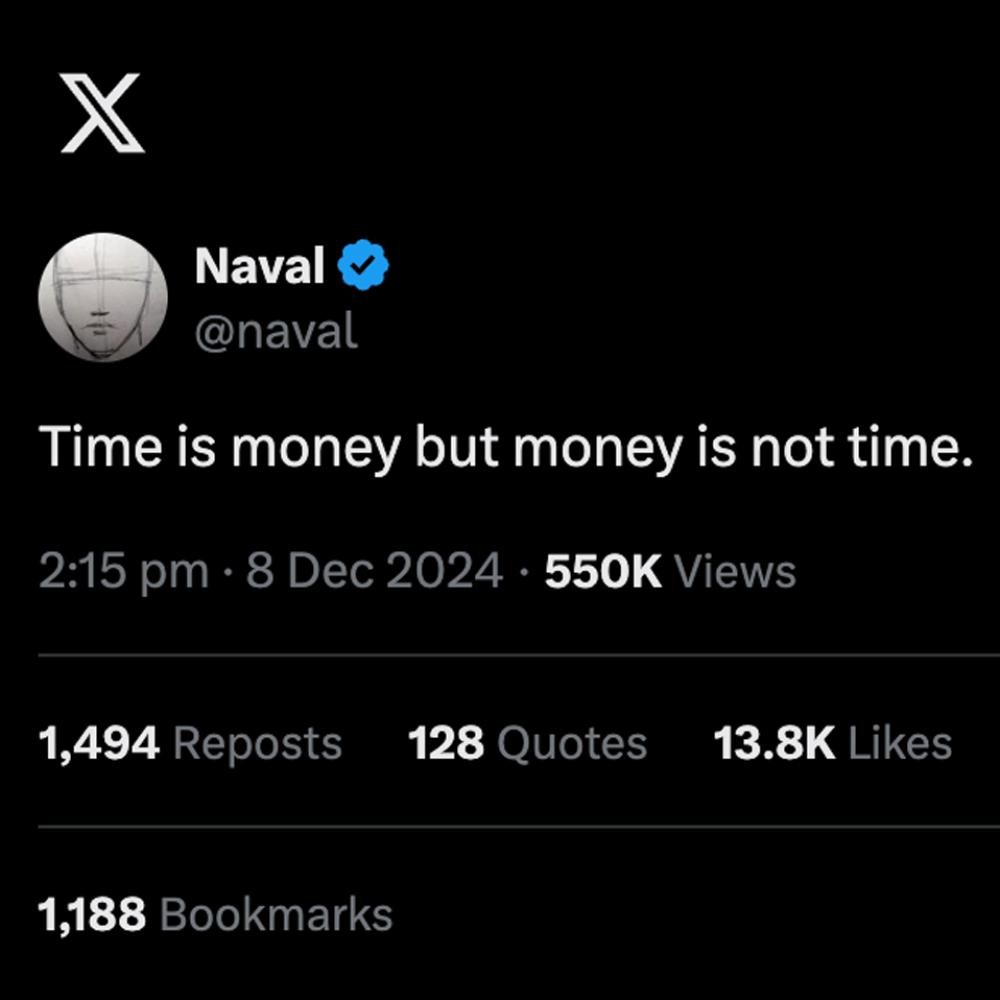
09 Dec Time = Money, Is Money = Time too?
I recently stumbled upon a quote by Naval Ravikant, a person I admire. His books have helped me build my perspectives in countless ways, and I respect his wisdom. Yet, this particular quote left me a tad bit unsettled. Since I lack direct access to him, I decided to write this post, hoping he might stumble upon it and address my confusion.
The Starting Point: Understanding Money and Wealth
Before diving into where the pinch is, allow me to indulge in the concepts of Money and Wealth, as I understand them, because they often collaborate with Time.
Money, at its core, is a zero-sum game. For someone to gain it, another must part with it. It’s a medium of exchange—transferable from one hand to another, one account to the next. Money doesn’t have to be earned through hard work alone. History is littered with instances of money being looted, stolen, or otherwise unfairly acquired. Nations and individuals alike have expended time and energy chasing it, whether through honest means or otherwise.
From this, two fundamentals about money can be agreed upon:
- Money is a zero-sum game.
- Time invested can facilitate the transfer of money from one source to another.
Wealth, however, operates on a different principle. Unlike money, Wealth creates Win-Win results. Time can turn money into wealth (when wisely invested), allowing compounding to work its magic. Beyond investments, wealth is often a product of Valuation, where individuals or entities pool their resources to create outcomes greater than the sum of their parts.
In essence:
- Money equals the sum of its parts.
- Wealth transcends this, always resulting in being greater than the sum of its parts.
Where money is finite and transactional, wealth is expansive and transformational.
The Proven Truth: Time Is Money
It’s hard to contest the adage, “Time is money.” Time is the currency we spend to earn money—whether through a job, business, passion, or other pursuits. The returns on this investment manifest as salaries, rewards, profits, and loot too.
For instance, an entrepreneur spends years building a business, investing their time to create systems, products, or services. Employees, too, exchange their hours for wages. Time flows, and money follows.
Thus, this part of the equation is clear and indisputable: time invested translates into money earned.
My Contention: Money Is Time
Now comes the crux of my disagreement with the quote. I firmly believe that Money is Time. When you have money, you can, quite literally, buy time.
Consider this:
- A person with financial means can hire a cook or cleaner to handle daily chores, freeing up hours for leisure, work, or personal pursuits.
- A more adventurous individual might hire a manager or assistant to oversee professional tasks, gaining the luxury of focus and flexibility.
- Business owners often assemble teams of managers and executives. By training them in their systems and processes, they delegate tasks, effectively in-sourcing their time. The team invests their hours, making money for themselves and the business owner.
In each case, Money buys Time, thus Money = Time. It allows individuals to escape mundane routines, outsource labour work, and focus on higher-order ambitions or personal fulfilment.
While the average person has 24 hours in a day, a moneyed person, through strategic delegation, effectively gains the time of multiple individuals. Their team’s combined efforts create a multiplier effect, enabling them to achieve far more than they could alone.
The Equation Revisited
Here’s where I land:
- Time = Money: Time spent on a job, business, or passion yields money.
- Money = Time: Money enables you to reclaim or multiply your time.
The relationship is reciprocal, a cycle where time and money feed into each other. For the ambitious, the wealthy, or the strategic, money amplifies time, transforming 24 hours a day into something far greater hours a day.
So, unless I am convinced otherwise, I’ll continue to stand by this belief. Time and Money are two sides of the same coin—each capable of creating and multiplying the other.
Einstein proved that Energy and Mass are the same thing. Though theproof is not mathematically proven yet, the relationship between Money and Time is T=MC^2, where C is the number of people Money can engage. Why is C raised to the power of 2? Because, when people come together under a good ‘System and Process’, the resultant Time is always greater than the sum of their Times.
What do you think?
If you liked this post, then you may consider reading Big 4 Life Questions & No Right Answers also.



No Comments